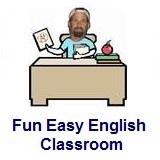|
|
| |
|
|
| |
|
|
| Fun Easy English Classroom June 18 |
|
| |
Classroom
Today
Learn to
correctly
write English
letter M |
|

Today in the classroom you are going to learn the
correct way to write the English alphabet letter M in
manuscript and cursive. |
 Hey
if you cannot understand something on this page, Hey
if you cannot understand something on this page,
then use the Fun Easy English
dictionary
(opens in a new window) |
|
|
|
|
|
|
|
 From
YOUR Teacher: From
YOUR Teacher:
This English language letter is not only fun to write
but delicious. If you like learning English and enjoy
eating chocolate then why not go out and get yourself a
bag of M&M'S today. |
|
|
|
|
Additional Lessons |
 About These
Lessons About These
Lessons
The following classroom lessons are great for students
who want additional conversation, listening, and reading
practice. |
-
Conversation Lesson -
Advanced
Level. Dialogs for everyday use.
Short situational dialogs for students of English as
a Foreign (EFL) or Second (ESL) Language with a
written conversation and a conversation notes
section.
|
 Conversation Lesson
21 - At the Movies Conversation Lesson
21 - At the Movies
(Advanced -
Conversation, Reading)
Dialogs for everyday use. Short situational dialogs for
students of English as a Foreign (EFL) or Second (ESL)
Language. |
At the Movies
BOB: We’d like two tickets for the 3:30
show, please.
TICKET SALES: Here you go. Enjoy the
movie! [Inside the theater]
BOB: Would you mind moving over one, so my
friend and I can sit together?
WOMAN: No, not at all.
BOB: Thanks a lot! |
|
Conversation Notes |
- The 3:30 show Movies are shown at different times
throughout the day. This refers to the movie that starts at 3:30. Notice the
emphasis on 3:30.
- Enjoy the movie! Notice how the intonation rises on
movie. This is said in a friendly way, and is followed by an exclamation
point.
- Would you mind is a polite way to ask “Can you do
something for me?” Notice the verb ends in “-ing.” Compare this structure to
“Would you mind if I” plus a verb that ends in “-ed” (Would you mind if I
opened the window?).
- Moving over one Here “one” is short for “one seat.”
- No, not at all is a way of saying “No, I don’t mind” or
“I will be glad to.” Notice the answer to “Would you mind” is in the
negative form.
|
|
Source: U.S. State Department |
|
Additional Conversation |
 Conversation Conversation
This is a collection of 30 situational conversations
which focus on a wide variety of communicative and
natural encounters in English....these
lessons are for beginning students. |
 Conversation Conversation
This is a collection of 36 situational conversations
which focus on spoken American English in a relatively
natural way....these
lessons are for intermediate students. |
 Conversation Conversation
English conversation lessons. 52
lessons covering pronunciation, speaking,
writing, and grammar topics....these
lessons are for beginning students. |
 Conversation Conversation
English conversation lessons. 30
lessons focusing mostly on communication and
grammar topics....these
lessons are for intermediate students. |
|
|
|
|
|
|
|
 Hey Students, Hey Students,
Use this dictionary and reference to look up any words you do not
understand in Fun Easy English.
Note: search opens in a new tab. |
|
|
|
|
|
Search Fun Easy English |
|
|
|
|
|
|
|
|
|
|
|
|
|
|
|
About
Contact
Copyright
Resources
Site Map |